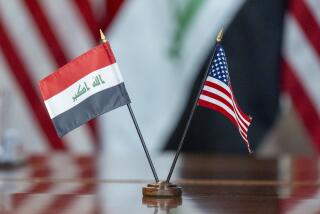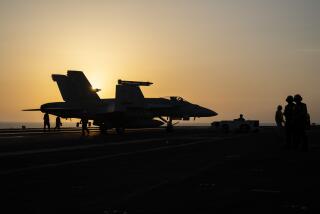Marine Dies in Kuwait Attack
- Share via
DOHA, Qatar — Gunmen opened fire Tuesday on Marines conducting an urban warfare exercise on a Kuwaiti island, killing one American and wounding another. The attack highlighted growing tensions in the Arab world as the United States prepares for a possible attack on Iraq.
The Marines, based at Camp Pendleton, returned fire with their M-16s and killed the two gunmen. Kuwait declared the attackers to be terrorists but did not immediately tie them to a specific group.
Pentagon officials said security would be increased at all U.S. bases in the region but did not say whether they regarded the shooting as a terrorist attack.
Gen. Richard B. Myers, chairman of the Joint Chiefs of Staff, met with other senior U.S. military officials and spoke by phone with commanders in the region to discuss other possible responses, a Pentagon spokesman said.
The attack was highly unusual in Kuwait, a close U.S. ally since the 1991 Persian Gulf War. More than a decade later, most Kuwaitis remain supportive of the relationship. However, analysts said that even in Kuwait, moderate Muslims feel caught between their more radical brethren and the United States.
The Kuwaiti government identified the gunmen as Anas Kandari, born in 1981, and Jassem Hajiri, born in 1976, and described them as Kuwaiti residents and Islamic extremists.
The Interior Ministry said it would “not allow anyone to undermine the country’s security.” Friends and associates of the men were being rounded up for questioning.
Thirty-one unarmed Kuwaiti civilians in the area of the exercise on Faylakah island, 10 miles east of Kuwait City, were taken into custody by the Marines as witnesses and turned over to local authorities for questioning, said a Navy spokesman in Bahrain, the U.S. military’s regional hub for Gulf operations.
“The two gunmen were in a vehicle that got close to the training,” said the spokesman, Lt. Christopher Davis. “They got close, jumped out and opened fire without any warning or provocation.”
Davis said the Marines were using dummy rounds when they were attacked and that they shifted to live rounds to defend themselves. Three AK-47 assault rifles and a cache of ammunition were found in the attackers’ pickup truck, officials said.
The two Marines who were shot were taken by helicopter to a military hospital used by U.S. personnel on the Kuwaiti mainland, where one died during surgery. The Marine’s name was withheld pending notification of relatives. The other Marine suffered an arm wound that was not considered life-threatening, Davis said.
“We mourn the loss of one of our brothers today, and we wish our injured Marine a speedy recovery,” said 1st Lt. Carrie Batson, spokeswoman for the 11th Marine Expeditionary Unit from Camp Pendleton. “However, we stand ready and able to continue our mission.”
The 150 Marines in the training exercise were withdrawn from the island after the shooting and sent to an encampment in the desert.
The Marines were among 1,000 combat troops from the 11th Marine Expeditionary Unit who are in Kuwait for a monthlong training exercise called Eager Mace.
The exercise, including live-fire training in the desert frontier between Iraq and Kuwait, had been scheduled for months. But it has taken on added significance and received more media attention in light of President Bush’s threat to use military force against Iraqi President Saddam Hussein.
The Marine exercise is the latest show of U.S. military muscle in the region. As tensions with Iraq have mounted, the U.S. has shifted weaponry and munitions from bases in Qatar and Saudi Arabia to bases in Kuwait in anticipation of a possible land offensive in Iraq.
Among the equipment being positioned are tanks and Bradley fighting vehicles, the kind of gear used by Army combat troops.
In addition, senior defense officials say elite special operations troops last month began training alongside CIA units that could be used in covert counter-terrorism operations within Iraq.
For much of the last decade, the Pentagon has based more than 20,000 U.S. military personnel within close striking distance of Iraq, along with heavy equipment for at least four armored brigades, as well as Patriot antimissile batteries to protect them.
In recent months, the Pentagon has moved or announced plans to move an additional 10,000 troops to the region, officially to conduct routine training exercises. But military officials acknowledge that the added troops may remain in the area for longer than their exercise schedules call for.
A leading Kuwaiti intellectual said in an interview that the gunmen might have been motivated by anger at the United States for its policies on Afghanistan, Iraq or the Israeli-Palestinian conflict.
“The incident cannot be cut off from its context: the escalation between the United States and the Islamists around the world,” said Abdullah Sahar, a political scientist at Kuwait University. “That has really weakened the moderate Islamists and empowered the radicals and the ignorant.”
Radicals have been gaining adherents around the world “and Kuwait is no exception,” he said. However, Sahar said he believes that the radical Islamic movement is weaker in Kuwait than in most Islamic countries. “The majority of Kuwaitis, even within the Islamist movement, do not consider America a hostile power in any way,” he said.
Of the shooters, he added: “Maybe they had relatives at Guantanamo. Maybe they had relatives killed in Afghanistan, or maybe they have some kind of philosophical agreement with Al Qaeda--we really don’t know at this time.”
He added that while most Kuwaitis admire the United States and appreciate what it did during the Gulf War, there is also widespread disagreement with U.S. foreign policy in the Mideast, and particularly with its support of Israel.
The shooting followed by less than two weeks an incident in which two men in a jeep, carrying a machine gun and many rounds of ammunition, tried to position their vehicle amid a convoy of American military vehicles along a Kuwait freeway.
The two were arrested by local authorities but released after saying that they were on their way to a bird hunt in the desert. The authorities described them as being drunk.
There have been other recent incidents targeting Americans in neighboring countries, including a violent demonstration outside the U.S. Embassy in Bahrain. Gunmen also opened fire outside a U.S. air base under construction in Qatar. No one was hurt in either of those incidents.
The site of Tuesday’s shooting, Faylakah island, was abandoned by its inhabitants when Iraq invaded Kuwait in 1990, and Iraqi forces heavily mined it during their occupation.
After a U.S.-led coalition liberated Kuwait in the Gulf War, the government compensated island residents for their property and resettled them on the mainland. The island was kept closed for several years while land mines were cleared. It has recently been reopened to Kuwaitis and tourists and has become a popular fishing spot.
While nearly all of the damage done by Iraq in Kuwait City has been repaired, Faylakah has been left largely untouched as a kind of war memorial. It was chosen by the U.S. military for urban warfare training because of the bullet-riddled ruins still left from the Iraqi occupation.
*
Times staff writers Esther Schrader in Washington and Mitchell Landsberg in Cairo contributed to this report.
More to Read
Sign up for Essential California
The most important California stories and recommendations in your inbox every morning.
You may occasionally receive promotional content from the Los Angeles Times.













